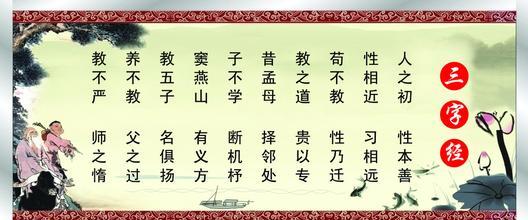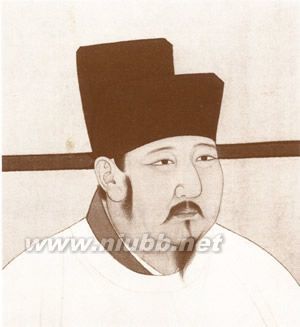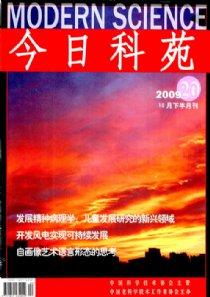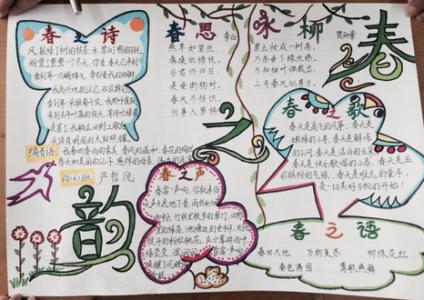汉英对照·注解·完整版
我周公,
作周礼。
著六官,
存治体。
Th' Prince of Chough
Did Rituals bestow,
Regimen he designed
And government defined.
周公制定了《周礼》,其中他设计了六宫的官制,规定了国家的体制。
The Prince of Chough wrote Rituals, in which he designed the nuptial system of the crown and defined the governmental system of the country.
大小戴,
注礼记。
述圣言,
礼乐备。
The Days supplied
Rituals well clarified,
And paraphrased adages
Of those sages.
戴德和戴圣叔侄二人整理并且注释了《礼记》,转述和阐扬了前代的典章制度和有关礼乐,阐明了圣贤的精辟言论。
The Days, i.e. Day Deh the uncle and Day Shen the nephew, annotated Rituals, and illustrated the decrees, regulations, and etiquette rules of ancient times and paraphrased what had been written by the sages then.
曰国风,
曰雅颂。
号四诗,
当讽咏。
The Psalms, say,
The Chants, say,
And those airs
Of various affairs.
《国风》、《大雅》、《小雅》、《颂》,合称为四诗,构成《诗经》这部内容最丰富、中国最早的诗歌总集。
The four collections, i.e. Airs of the States, Psalms Major, Psalms Minor, and Chants constitute the Poems or Book of Odes, a rich resource of poems,the earliest collection in China.
诗既亡,
春秋作。
寓褒贬,
别善恶。
When Poems perished,
Spring 'nd Fall flourished
Flogging what's lewd,
Praising what's good.
随着周朝的衰落,《诗经》变得默默无闻了,在此情况下孔子作了《春秋》,以借古讽今、扬善去恶。
As the Chough House declined, the Poems or Book of Odes lost its popularity, so Confucius compiled Spring 'nd Fall to criticize the ill-doing, and praise the well-being, of the society.
三传者,
有公羊,
有左氏,
有谷梁。
Companion authors three:
Zuo Qiu-ming, and he
Who was Gongyang,
And another, Goo Liang.
三传是解释《春秋》的三部书,指羊高所著的《公羊传》、丘明所著的《左传》和谷梁赤所著的《谷梁传》。
The three companions to Spring 'nd Fall were those written by Yang Gao (Gongyang Gao), Tsuo Qiu-ming, and Goo Liang.
经既明,
方读子。
撮其要,
记其事。
Classics well read
Study sophists ahead.
Make a list,
Get the gist.
读完了这些经传,明白了其间的道理,就可以读子书了。由于子书很多,应该选择一些比较重要的来读,而且还要记住每一事件的要点。
After finishing the classics, you can read sophistic essays. Since there are so many such books, you should make a list of important ones and try to get the gist of each.
五子者,
有荀扬。
文中子,
及老庄。
Five sophists then
Were great men:
Hsun, Wenzhong, Yang
Lao and Tsuang.
五子所著的书,称为子书,所谓五子指荀子、扬子、文中子、老子和庄子。
The books written by five sophists are called sophistic books.The five sophists refer to Hsuncius, Yangcius, Wenchongcius, Laocius, and Tsuangcius.
经子通,
读诸史。
考世系,
知终始。
After finishing these
Read histories please.
Do study genealogy
And know causality.
经书和子书都读熟了之后,就可以读史书了。读史书时应该考究各朝各代的世系,明白其盛衰的原因,只有这样才能从历史中记取教训。
After you have finished the classic and sophistic books, you can read annals. When you do this, you should inquire into the genealogies of the dynasties, learn the causes of the vicissitudes, and draw lessons from them.
自羲农,
至黄帝。
号三皇,
居上世。
The legendary Fooshee,
Shennong and Huangdee
Were great forefathers,
Esteemed Three Emperors.
伏羲氏、神农氏和黄帝是三位上古时代的先驱,他们勤政爱民,开拓有功,被后人尊称为“三皇”。
Fooshee, Shennong and Huangdee, the forefathers who pioneered the land and took care of the masses, were esteemed Three Emperors.
唐有虞,
号二帝。
相揖逊,
称盛世。
Yao 'nd Shun, precursors,
Called Two Emperors.
Yao demised throne,
A heyday known.
黄帝之后,还有两位贤明的帝王,叫唐尧和虞舜。尧认为儿子不肖,便把帝位传给了贤能的舜。两位帝王开创了华夏的人间盛世。
After Huangdee came two greatest figures of all times, Yao and Shun. Yao, unsatisfied with his son, demised his throne to the able Shun. Under their governance, there appeared a heyday in China.
夏有禹,
商有汤。
周文武,
称三王。
Hsiah, Shang, Chough,
Three dyansties, lo.
Yuh, Tang, Wuh,
Three kings true.
夏朝的开国君主是禹,商朝的开国君主是汤,周朝的开国君主是武王。这几个德才兼备的君王被后人尊称为“三王”。
Yuh founded Hsiah, Tang founded Shang, and Wuh founded Chough. These three figures were called Three Kings because of their great merits.
夏传子,
家天下。
四百载,
迁夏社。
Yuh, heredity begun,
Throned his son.
Four centuries passed
Seeing Hsiah's last.
大禹把帝位传给了自己的儿子,开启了君王的世袭制。四百多年之后,夏被汤所灭。
Yuh passed his throne on to his son, hence the hereditary system of the crown. More than four hundred years later, Hsiah was annulled by Tang.
汤伐夏
国号商
六百载
至纣亡
The conqueror Tang
Founded Kingdom Shang.
Six centuries' elapse
Ere Chow's collapse.
商汤王起兵灭掉了夏,建立了商朝。商朝前后延续六百年,至商纣王时灭亡。
King Tang finished Hsiah and founded the Shang Dynasty, which lasted six hundred years before its end at Tsough's Era.
周武王,
始诛纣。
八百载,
最长久。
Wuh of Chough
Triumphed over Chow.
Eight centuries' gain,
Chough's longest reign.
周武王杀死商纣王,灭掉商朝,建立了周朝。周朝在所有朝代中历史最长,前后延续了八百多年。
Wuh founded the Chough Dynasty after having nullified the Shang Dynasty and killed Chow the tyrant. Chough lasted more than eight hundred years, the longest of all dynasties.
周辙东,
王纲坠。
逞干戈,
尚游说。
Chough moved east,
And controlled least.
There arose militance;
Valued was eloquence.
自从周朝东迁国都之后,便很难有效地管理诸侯了。诸侯国之间战争不断,而游说之士也开始大行其道。
Chough moved its capital east, hence the Eastern Chough. The Chough House had less and less control over its vassals. There were often wars among the vassal states, and lobbyists held sway.
始春秋,
终战国。
五霸强,
七雄出。
Spring 'nd Fall began,
Warring States then.
Five Swayed strong;
Seven States sprung.
东周分为前后两个阶段,前期史称春秋,后期为战国。春秋时期有著名的五霸,为齐恒公、宋襄公、晋文公、秦穆公和楚庄王。战国时七个诸侯国很强大,称为七雄,分别是齐楚燕韩赵魏秦。
The Eastern Chough was divided into two periods, the Spring 'nd Fall period and the Warring State period. Huan of Chih, Xiang of Song, Wen of Jin, Muh of Chin, and Tsuang of Chuh became predominant, called Five Hegemons. The seven powers in the Warring States period were the State of Chih, the State of Chuh, the State of Yan, the State of Han, the State of Weigh, and the State of Chin.
嬴秦氏,
始兼并。
传二世,
楚汉争。
Emperor the First
Other states burst.
Generations but two,
Arose Han 'nd Chuh.
战国末年,秦国崛起,日渐强大,秦王赢政兼并六国,建立了统一的秦朝,自称始皇帝。秦传到二世,天下又开始大乱,最后形成楚汉相争的局面。
At the end of the Warring State period, the State of Chin became more and more powerful. Under the king who termed himself as Emperor the First, Chin annexed other six powers, and founded the unitary Chin Dynasty. At the second reign of the dynasty, the country was thrown into a turmoil, hence the contention between Chuh and Han.
高祖兴,
汉业建。
至孝平,
王莽篡。
Liu Bang almighty ran;
Arose Great Han.
Hsiao Ping was slayed;
So Wang Mang swayed.
汉高祖刘邦在楚汉相争中获胜,建立了汉朝。汉朝历时两百余年,到了孝平皇帝时,被王莽篡了位。
The Han Dynasty arose with Liu Bang's victory over his opponent. The dynasty lasted more than two hundred years until Wang Mang usurped the throne of Emperor Hsiao Ping.
光武兴,
为东汉。
四百年,
终于献。
With Guang Wuh began
The Eastern Han.
Th' four hundredth year,
Hanhsian died drear.
王莽篡权,导致天下大乱。刘秀推翻更始帝,恢复国号为汉,史称东汉光武帝,东汉延续四百年,到汉献帝时灭亡。
Wang Mang's usurpation threw the world into upheavals. Liu Hsiu, i.e. Emperor Guang Wuh, overthrew Emperor Gengshih and restored the Han Dynasty, hence the Eastern Han, which lasted four hundred years, until Emperor Hanhsian died.
魏蜀吴,
争汉鼎。
号三国,
迄两晋。
Shuh, Woo, Weigh
Struggled their way,
Three kingdoms reared;
Two Jins appeared.
东汉末年,魏国、蜀国、吴国争夺天下,形成三国相争的局面。后来魏灭了蜀国和吴国,但又被司马懿篡夺了帝位,建立了晋朝,晋又分为东晋和西晋两个时期。
In the last years of the Eastern Han Dynasty, Weigh, Shuh, and Woo fought against each other, hence the Three Kingdom period. At last, Weigh annulled Shuh and Woo, but it was soon superseded by the Jin Dynasty when Sih Ma-Yih usurped the throne. Jin includes two periods, the Western Jin and the Eastern Jin.
宋齐继,
梁陈承。
为南朝,
都金陵。
Song, Chih, Liang,
And Chen sprang.
The Southern Regals,
Nanking as capitals.
晋朝王室南迁之后,不久就衰亡了,继之而起的是南北朝时代。南朝包括宋齐梁陈,国都都建在南京。
Soon after it moved south, the Jin House died out. Then came the Southern and Northern Dynasties period. The Southern Dynasties include Song, Chih, Liang, and Chen, all seated in Nanking.
北元魏,
分东西。
宇文周,
兴高齐。
Northern Weigh, pressed,
Divided, east 'nd west.
Yuhwen founded Chough,
Chih followed though.
北朝始自北魏,北魏也叫元魏。北魏后来又分裂成东魏和西魏。西魏被宇文觉篡了位,建立了北周;东魏被高洋篡了位,建立了北齐。
The Northern Courts started from Northern Weigh, which later was divided into the Eastern Weigh and the Western Weigh. The Eastern Weigh was usurped by Yuhwen, who established the Northern Chough, and the Western Weigh was usurped by Gao-Yang, who established the Northern Chih.
迨至隋,
一土宇。
不再传,
失统绪。
Suih, so grand,
United the land.
It did bloom
Before its doom.
杨坚重新统一中国,建立了隋朝。他的儿子隋炀帝杨广即位,由于他荒淫无道,隋朝很快就灭亡了。
Yang Jian established the Suih Dynasty, and China was united again.Before soon it was superseded by the Tang Dynasty, due to the debauchery of Emperor Suih Yang, who was Yang Jian's son.
唐高祖,
起义师。
除隋乱,
创国基。
Li Yuan's uprising now
Swept Suih enow.
Th' Tang Empire rose
At Suih's close.
唐高祖李渊起兵反隋,他战胜了各路反隋义军,夺取天下,建立了唐朝。
Li-Yuan raised troops against Suih, defeated many opponents, and set up the Tang Dynasty as Suih was finished.
二十传,
三百载。
梁灭之,
国乃改。
Three centuries' gains
Made twenty reigns.
Arising, the Liang
Replaced the Tang.
唐朝的统治近三百年,总共传了二十位皇帝。唐哀帝被朱全忠篡位,建立了梁朝,唐朝从此灭亡。为了和南北朝时期的梁相区别,历史上称为后梁。
The Tang Dynasty reigned for nearly three hundred years, with twenty emperors in all. Emperor Tang-Ai was usurped by Chu Quanzhong, who founded the Liang Dynasty, termed the Latter Liang to be distinguished from the former Liang.
梁唐晋,
及汉周。
称五代,
皆有由。
Thus started Liang,
Jin and Tang,
Han and Chough;
Five you know.
后梁之后或期间,还有后唐、后晋、后汉和后周,这段时间历史上称作五代。
After, and concurrent with, the Latter Liang, there were the Latter Tang, the Latter Jin, the Latter Han, and the Latter Chough, and this period is called the Five Dynasties.
炎宋兴,
受周禅。
十八传,
南北混。
Then Song, aglow,
Succeeded to Chough.
Reigns counted eighteen,
Bearing invasions keen.
赵匡胤接受了后周“禅让”的帝位,建立了宋朝。宋朝相传了十八个皇帝,其间北方的少数民族南下侵扰,南北之间持续混战。
Chao Kuangyin, accepting the demised throne of the Latter Chough, founded the Song Dynasty. At the eighteenth emperor's reign, the ethnics from the north invaded the land, hence scuffles between the north and the south.
辽与金,
皆称帝。
元灭金,
绝宋世。
Liao and Jin
Both broke in.
The Mongol throng
Wiped out Song.
北方的辽人、金人和蒙古人都建立了国家,都自称皇帝。最后,蒙古人灭了金朝和宋朝,建立了元朝,再一次统一了中国。
Liao, Jin, and Mongols in the north established their polities and their chieftains claimed to be emperors. In the end, the Mongols annulled Jin and Song and set up the Yuan Dynasty, hence the reunification of China.
舆图广,
超前代。
九十年,
国祚废。
The territory vast
Exceeded all past.
Ninety years elapsed;
The empire collapsed.
元朝疆域辽阔,其领土超过了以前的任何一个朝代。然而它只维持了短短的九十年,就被农民起义推翻了。
The Yuan Dynasty had a territory larger than any other previous dynasties. However, it lasted only ninety years before it was overthrown by a peasant uprising.
太祖兴,
国大明。
号洪武,
都金陵。
Eighth by name
Won his fame,
By founding Ming,
Seated in Nanking
元朝末年,明太祖朱元璋起义,最后推翻了元朝的统治,建立了大明,国号洪武。他自己当上了皇帝,定都在金陵。
At the end of the Yuan Dynasty, Chu Yuanzhang's peasant uprising overthrew the reign of the Mongolian Empire. Chu Yuanchang founded the Ming Dynasty, coronated himself as its first emperor,hence Taitsuh (the beginning father). Ming's capital was Nanking.
迨成祖,
迁燕京。
十六世,
至崇祯。
Chengtsuh from Nanking
Moved to Peking.
Sixteen emperors past,
Chongchen the last.
到明成祖即位后,便把国都由金陵迁到燕京。明朝共传了十六个皇帝,直到崇祯皇帝为止,明朝就灭亡了。
After his coronation, Chengtsuh moved the capital from Nanking to Peking. There were sixteen emperors in the Ming Dynasty, Chongchen being the last.
阉祸后,
寇内讧。
闯逆变,
神器终,
The eunuch power
Made all cower.
King of Spurt,
Did Ming subvert.
明朝末年,宦官专权,天下大乱,老百姓纷纷起义。以闯王李自成为首的起义军攻破北京,明朝最后灭亡。
In the last years of the Ming Dynasty, eunuch officials abused their power to such an extent that there were uprisings in many places. Li Zicheng, the so-called King of Spurt broke into Peking (Beijing) and subverted the Ming Dynasty.
古今史,
全在兹。
载治乱,
知兴衰。
History is here,
Until this year.
You know all:
Rise and fall.
以上所叙述的是从三皇五帝直到今天的历史。从中大家可以了解各朝各代的治乱兴衰,学会很多有用的东西。
What has been talked above is the history from antiquity up to now, from which one can learn lessons from the rise and fall of all the dynasties.
史虽繁,
读有次。
史记一,
汉书二。
Read history vast
First to last
History Book begun
Han Annals anon
中国历史浩繁复杂,应讲究方法,循序渐进,先读《史记》,再读《汉书》。
Since Chinese history is so complicated, you should read it in good order, History Book first, then the Han Annals.
后汉三,
国志四。
兼证经,
参通鉴。
Next Eastern Han,
Three Kingdoms then.
Read the authorized

With Mirrors beside.
第三读《后汉书》,第四读《三国志》,读的同时,还要参照经书,参考《资治通鉴》,这样我们就可以更好地了解历史的治乱兴衰了。
You can proceed to read the Eastern Han and the Three Kingdoms. While you study these authorized books, you can consult the Mirrors so that you can have a better idea of what happened in Chinese history.
读史者,
考实录。
通古今,
若亲目。
As past's explored,
Check every record.
You'll know how
Then became now.
读历史的人应该更进一步地去翻阅历史资料,了解古往今来的前因后果,就好象是自己亲眼所见一样。
Those who are interested in history can check historical records to go through the incidents as if you see them happen yourself.
口而诵,
心而惟。
朝于斯,
夕于斯。
Read and think
And pieces link
From early morning
To late evening.
读书时,应该放声朗诵,还要用心去思考。只有早早晚晚都把心思用到学习上,才能真正学好。
When you do reading, you should read aloud and contemplate. Only when you are devoted to this can you learn well.
昔仲尼,
师项橐。
古圣贤,
尚勤学。
Confucius, of yore
Studied, studied more,
From Tuo learned,
As he yearned.
从前,孔子是个十分好学的人,当时鲁国有一位神童名叫项橐,孔子就曾向他学习。像孔子这样伟大的圣贤,尚不忘勤学,何况我们普通人呢?
Confucius was a good learner. Once he met a prodigy called Xiang Tuo in the Luh State and consulted him. Even a sage like Confucius was so intent on his studies, shouldn't we follow suit?
赵中令,
读鲁论。
彼既仕,
学且勤。
Chao Puh of Song
Read Analects long
This premier crack
Was never slack.
宋朝宰相赵普,尽管身居要职,天天还手不释卷地阅读论语。
Chao Puh, the famous premier of the Song Dynasty, studied the Analects intensively everyday although he was in such a high position.
披蒲编,
削竹简。
彼无书,
且知勉。
Using cattail tips
And bamboo slips,
None they possessed
Persisting with zest.
西汉时路温舒把文字抄在蒲草上阅读。公孙弘将春秋刻在竹子削成的竹片上。他们两人都很穷,买不起书,但还不忘勤奋学习。
In the Western Han Dynasty, Lu Wenshu copied words on cattail tips for reading, and Gongsun Hong carved the Spring 'nd Fall on bamboo slips. They, both poor, couldn't afford to buy books, but they pressed on to study.
头悬梁,
锥刺股。
彼不教,
自勤苦。
Head hung high!
Needled his thigh!
Not pushed, they
Kept working away.
晋朝时的孙敬和战国时的苏秦都发奋读书。为了不犯困,一个把头发悬挂在屋梁上,一个用锥子刺自己的大腿。
Sun Jing in the Jin Dynasty and Soo Qin in the Warring State period were serious with their study, one keeping his hair hung from a beam, another needling his thigh lest they should feel sleepy.
如囊萤,
如映雪。
家虽贫,
学不辍。
With fireworms bright,
With snow white,
Poor, having none,
They studied on.
晋朝时车胤读书时把萤火虫放在纱袋里采光照明,还有一位叫孙光的则以雪的反光来看书。他们的生活条件如此艰苦却能持之以恒地读书。
To carry on with their reading, Che Yin in the Jin Dynasty kept fireworms in a gauze bag to produce light, and Sun Guang made use of the reflection from snow. They could manage even in such unfavorable conditions.
如负薪,
如挂角。
身虽劳,
犹苦卓。
Carrying fuel now,
Book on cow,
They, making time,
Employed their prime.
汉朝的朱买臣,以砍柴为生,往往一边担柴一边读书。隋朝的李密把书挂在牛角上,一有时间就读。
Zhu Maichen in the Han Dynasty chopped firewood for a living. He kept reading while carrying firewood on his back. And Li Mi hung his book on a horn of his cow and made time to read it.
苏老泉,
二十七。
始发愤,
读书籍。
Suh, twenty seven
Hadn't studied even.
This man now
Read hard enow.
宋朝的苏老泉,即苏洵,二十七岁时才立志读书,发奋图强而成为学问大家,名列唐宋八大家。
Suh Laoquan, i.e. Suh Xun didn't make his mind to study until he was twenty seven. He finally succeeded as a famous scholar, one of the eight greatest men of letters in the Tang and the Song Dynasties.
彼既老,
犹悔迟。
尔小生,
宜早思。
This man, behold,
Started when old.
You'd make time
While in prime.
苏老泉成年之后才认识到读书的重要性。我们年轻人难道不应该抓紧时间好好学习吗?
Only when he was a grown-up did he realize the importance of learning. Don't we need to make use of our time to study while we are young?
若梁灏,
八十二。
对大廷,
魁多士。
A wizard true,
When eighty two,
Passed Grand Test,
Beating the rest.
宋朝有个梁灏,在82岁时才考中状元,在金銮殿上对皇帝的提问能够对答如流,其他生员皆不如他。
Liao Hao in the Song Dynasty passed the Imperial Examination at the age of 82. He defended himself so well when the emperor questioned him at the court that he was better than all other examinees.
彼既成,
众称异。
尔小生,
宜立志。
His great success
Did all impress.
While you're young,
Make wills strong.
梁灏如此高龄,尚能获得成功,让众人感到诧异。我们趁着年轻,难道不该立志向学吗?
Liang Hao succeeded at such an advanced age, surprising everybody. Shouldn't we make up our mind to learn while we are young?
莹八岁,
能咏诗。
泌七岁,
能赋棋。
Ying composed great
Poems at eight.
Mih rhymed even
Then at seven.
北齐有个叫祖莹的人八岁就能写诗,唐朝的李密七岁就能以象棋为题赋诗。
Zhu Ying in the North Qih Dynasty could compose poems at eight,and Li Mih in the Tang Dynasty could even rhyme chess playing at seven.
彼颖悟,
人称奇。
尔幼学,
当效之。
They, so clever,
Praised with wonder.
Like them, begin
Now to win.
他们两人的聪明才智让世人羡慕,称奇,我们也当效法他们,及早地努力学习。
They were so admired for their talents and performance.We should follow suit to start as early as possible.
蔡文姬,
能辩琴。
谢道韫,
能咏吟。
Cai could discern
An ill-tuned zithern.
Hsieh could prose
Or poems compose.
中国古代还有一些出色的女才子,如东汉末年的蔡文姬能听出琴声的好坏,晋朝的谢道韫则能出口成章,即兴作诗。
And there were some talented girls in ancient China, for example, Cai Wenjih could discern the quality of a zithern by the ear, and Hsieh Daowen could write prose or compose poems at short notice.
彼女子,
且聪敏。
尔男子,
当自警。
These girls above
Did smart prove.
Man thou art,
Devote thy heart!
女孩子都如此聪慧多才,身为好男儿更应当自强。
Girls like them could be so accomplished,as men you should sustain yourselves.
唐刘晏,
方七岁。
举神童,
作正字。
Now Yan, behold,
Seven years old.
Proofread did he
Such a prodigy.
唐玄宗时,有一个名叫刘晏的小孩子,才只有七岁,就被推举为神童,并且做了负责刊正文字的官。
In the era of Tang Hs uantsong, a boy named Liu Yan, was promoted to be an imperial censor at seven.
彼虽幼,
身已仕。
有为者,
亦若是。
Young as he,
An official already.
To be well-done,
Follow this one.
刘晏年纪这么小就做了官,担当国家给他的重任。只要勤奋好学,大家也可以和刘晏一样名扬后世。
Young as Liu Yan was, he was given an important position. If one works hard, he can be as famous as Liu Yan.
犬守夜,
鸡司晨。
苟不学,
曷为人。
Dogs thieves bite;
Cocks dawn invite.
Unless you learn,
Inhuman you'll turn.
狗在夜间守家门,鸡在天亮时报晓,人如果不能用心学习而糟蹋时光,还有什么资格称为人呢。
Dogs keep the door at night, and cocks crow to tell good morning. If one loafs around, doing nothing, how can he be called man?
蚕吐丝,
蜂酿蜜。
人不学,
不如物。
Silkworms silk educe;
Bees honey produce.
Such you learn,
Or receive spurn.
蚕吐丝以供我们做衣料,蜜蜂可以酿蜜,供人们食用。人如果不懂得学习,以自己的知识、技能来服务社会,那还不如小动物呢。
Silkworms provide us with silk, and bees provide us with honey. If one does not acquire knowledge to serve the society, he is not as worthwhile as such small things.
幼而学,
壮而行,
上致君,
下泽民。
Learn when young;
Act while strong.
Benefit each one
Under the sun.
幼年时我们就当努力学习,积累知识,长大后才能够学以致用,替国家效力,为人民谋福利。
We should start early to learn and improve ourselves so that when we grow up we can serve the country and people.
扬名声,
显父母。
光于前,
裕于后。
Carve your name
And parents' name.
Ancestors you glorify;
Offspring you dignify.
如果你能有所作为,有益于社会,人民就会颂扬你,父母也会感到荣耀,你给祖先增添了光彩,也给下代留下了好的榜样。
If you have done your bit for the society, you will be remembered for that, and your parents and even ancestors will share your glory, and your descendants can follow your example.
人遗子,
金满赢。
我教子,
唯一经。
For children hold
Silver and gold?
My only bequest:
Learn your best.
很多人给子孙后代积攒钱财,而我并不这样,我留给他们的遗产只是教诲:希望他们能精于读书学习,好好做人。
Many people save money for their children. But I don't do this. My bequest for them is the teaching that they should try their best to learn.
勤有功,
戏无益。
戒之哉,
宜勉力。
Good is diligence;
Poor is negligence.
Trials you breast,
Work with zest.
凡是勤奋上进的人,都会有好的收获,而只顾贪玩,浪费了大好时光是一定要后悔的。大家应当戒除懒惰的诱惑,勉力向前。
No pains, no gains. If one squanders time, he will regret later on. We should guard against laziness, and go ahead with fortitude.
 爱华网
爱华网


